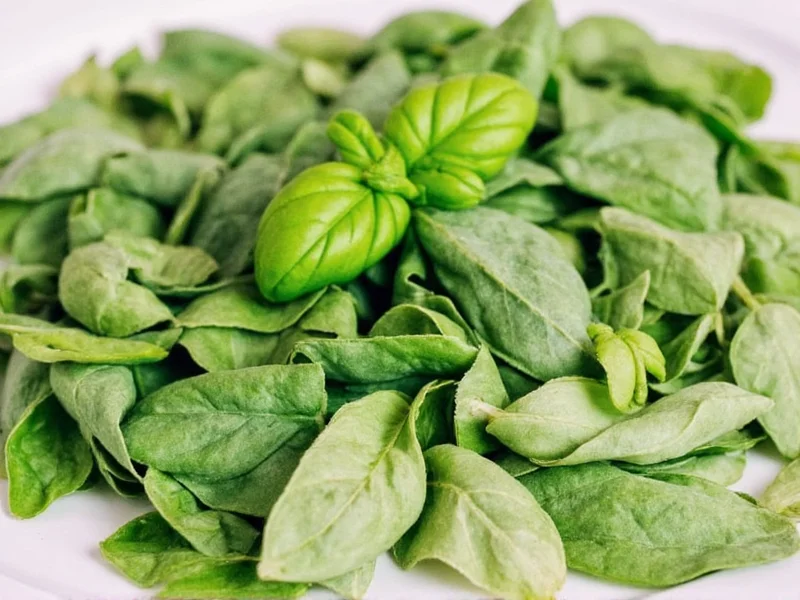Drying sweet basil preserves its aromatic flavor for year-round cooking. Whether you've harvested a bumper crop from your garden or bought more than you can use fresh, proper drying techniques maintain maximum flavor and prevent mold. This guide covers four reliable methods with professional tips you won't find elsewhere.
Why Proper Drying Matters for Sweet Basil
Sweet basil (Ocimum basilicum) contains volatile oils that give it distinctive flavor. Improper drying destroys these compounds through oxidation or moisture retention. When you learn how to properly dry basil leaves, you preserve up to 90% of the essential oils compared to improper methods that lose 50% or more. Dried basil lasts 6-12 months when stored correctly, making it economical and reducing food waste.
Optimal Harvesting for Drying
Timing affects drying success significantly. For the best way to dry sweet basil at home, harvest in the morning after dew evaporates but before midday heat. Choose stems with fully developed leaves that haven't flowered yet, as flowering reduces oil content. Cut 6-8 inch stems using clean scissors to avoid bruising. Avoid wet leaves as they promote mold during drying.
Preparation Before Drying
Gentle preparation ensures clean, mold-free results:
- Rinse stems quickly under cool running water
- Shake off excess moisture or use salad spinner on low
- Pat leaves dry with clean linen towel (never paper towels that leave fibers)
- Remove any damaged or yellowing leaves
- Keep stems intact - don't separate individual leaves yet
Four Proven Drying Methods Compared
Each technique has advantages depending on your climate and equipment. Here's how to dry sweet basil using different approaches:
| Method | Time Required | Best For | Flavor Preservation |
|---|---|---|---|
| Air Drying | 1-2 weeks | Dry climates, large harvests | Excellent (90-95%) |
| Oven Drying | 2-4 hours | Humid climates, quick results | Good (75-85%) |
| Dehydrator | 4-8 hours | Precise temperature control | Very Good (85-90%) |
| Micro-drying | 5-10 minutes | Emergency small batches | Fair (60-70%) |
Air Drying: The Gold Standard Method
For drying sweet basil for long term storage, air drying preserves flavor best:
- Bundle 5-6 stems together with twine or rubber band (use loose band as stems shrink)
- Hang upside down in dark space with 40-60% humidity (closets work well)
- Maintain temperature between 70-80°F (21-27°C) with gentle airflow
- Cover bundles with paper bag with holes to prevent dust accumulation
- Check after 7 days - leaves should crumble when touched
Avoid direct sunlight which degrades flavor compounds. In humid climates, add silica gel packets nearby to absorb moisture.
Oven Drying Technique
When you need how to dry sweet basil quickly during rainy season:
- Preheat oven to lowest setting (150-170°F / 65-75°C)
- Place single layer of leaves on parchment-lined baking sheet
- Prop oven door open 2-3 inches with wooden spoon
- Rotate sheets every 30 minutes for even drying
- Remove when leaves crumble (usually 2-4 hours)
Never exceed 180°F (82°C) as higher temperatures destroy essential oils. Oven drying works best for small batches.
Dehydrator Method
For consistent results with air drying vs oven drying basil comparison:
- Set dehydrator to 95°F (35°C)
- Arrange leaves in single layer on trays
- Dry for 4-8 hours checking periodically
- Leaves should feel papery but not brittle
Dehydrators provide controlled environment ideal for humid regions. The low, steady heat preserves more flavor than oven drying.
How to Tell When Basil is Fully Dried
Properly dried basil shows these characteristics:
- Leaves crumble easily when touched (not leathery or soft)
- No visible moisture when crushed
- Stems snap rather than bend
- Color changes from bright green to deeper olive green
Under-dried basil develops mold in storage. Over-dried basil becomes brittle and loses flavor. Test one leaf before storing the entire batch.
Proper Storage for Maximum Shelf Life
Even perfect drying fails with improper storage. Follow these steps for how to store dried sweet basil effectively:
- Remove leaves from stems by rubbing between fingers
- Sift through to remove stems and debris
- Store in airtight glass container (Mason jars ideal)
- Keep in dark cupboard away from heat sources
- Add oxygen absorber packet for extended storage
Label containers with harvest date. Properly stored dried basil maintains best flavor for 6 months, remaining usable for up to 1 year. Avoid plastic bags which trap moisture.
Using Dried Sweet Basil in Cooking
Dried basil has concentrated flavor - use one-third the amount of fresh basil in recipes. It works best in:
- Long-simmered tomato sauces and soups
- Rubbed on meats before roasting
- Homemade herb blends like Italian seasoning
- Infused oils and vinegars
For using dried sweet basil in cooking, add early in cooking process to rehydrate and release flavors. Fresh basil works better in salads and finished dishes where bright flavor matters.
Troubleshooting Common Drying Issues
Address these frequent problems when learning how to dry sweet basil properly:
- Mold development: Caused by high humidity or insufficient airflow. Start over in drier location with better ventilation.
- Leathery texture: Indicates under-drying. Return to drying process until leaves crumble.
- Brown spots: Result from too much heat. Use lower temperatures next time.
- Dull flavor: Basil harvested after flowering or dried too quickly. Harvest earlier next season.











 浙公网安备
33010002000092号
浙公网安备
33010002000092号 浙B2-20120091-4
浙B2-20120091-4